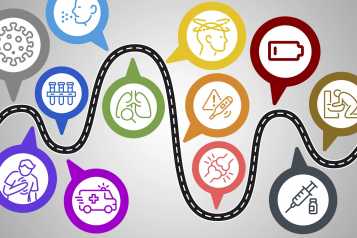Coronavirus: latest information

For the most up to date information about COVID-19 be sure to check Gov.uk.
Correct as of 24/03/2020, 12:30pm
Staying home to stop coronavirus spreading
The single most important action we can all take, in fighting coronavirus is to stay at home in order to protect the NHS and save lives.
When we reduce our day-to-day contact with other people, we will reduce the spread of the infection. That is why the Government has introduced new measures to tackle the spread of coronavirus, including a ban on public gatherings of more than two people.
According to guidance, you should now only leave the house for one of four reasons:
1. Shop for basic essentials – only when you really need to.
2. One form of exercise a day – such as a run, walk or cycle, alone or with other people you live with.
3. Medical need – for example, to visit a pharmacy or deliver essential supplies to a vulnerable person.
4. Travel to and from work – but only where this is absolutely necessary.
If you do need to go outside for one of these reasons, it's important that you always keep a distance of 2m (6ft) from other people.
If you think you might have coronavirus
Symptoms
-
A high temperature
- A new, continuous cough
What to do if you have these symptoms
Do not go to a GP surgery, pharmacy or hospital. You should stay at home and self isolate.
Only call 111 if you cannot get help online.
You do not need to contact 111 to tell them you're staying at home. Read the NHS advice about staying at home.
Use the NHS 111 online coronavirus service if:
- You feel you cannot cope with your symptoms at home
- Your condition gets worse
- Your symptoms do not get better after 7 days
How to self isolate if you or someone in your house has coronavirus
If you have symptoms of coronavirus you should stay home and self isolate. What this means is you should not leave your house, even to do shopping, to avoid spreading the virus. If you live alone, you should stay at home for seven days from when your symptoms started. If you live with others, then you must stay at home for seven days from when your symptoms started. However, everyone else in the household who is well must stay at home and not leave for 14 days.
For more information about when to self isolate and what this means for families visit the Government website.
How to avoid catching or spreading germs
Do:
-
Cover your mouth and nose with a tissue or your sleeve (not your hands) when you cough or sneeze.
-
Put used tissues in the bin straight away.
-
Wash your hands with soap and water often, and for 20 seconds – use hand sanitiser gel if soap and water are not available.
-
Try to avoid close contact with people who are unwell.
Don't:
-
Do not touch your eyes, nose or mouth if your hands are not clean.
Advice for people at high risk
If you're at high risk of getting seriously ill from coronavirus, there are extra things you should do to avoid catching it. These include:
- Not leaving your home – you should not go out to do shopping, visit friends or family, or attend any gatherings
- Avoiding close contact with other people in your home as much as possible
For the full list of people who are considered high risk visit the Government website.
Further information
NHS England has produced a list of common questions about coronavirus, covering advice for you and your family, how it's caught and spread, prevention, self-isolation, testing and treatment and foreign travel.
Other places for information:

